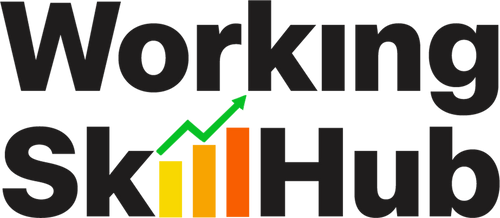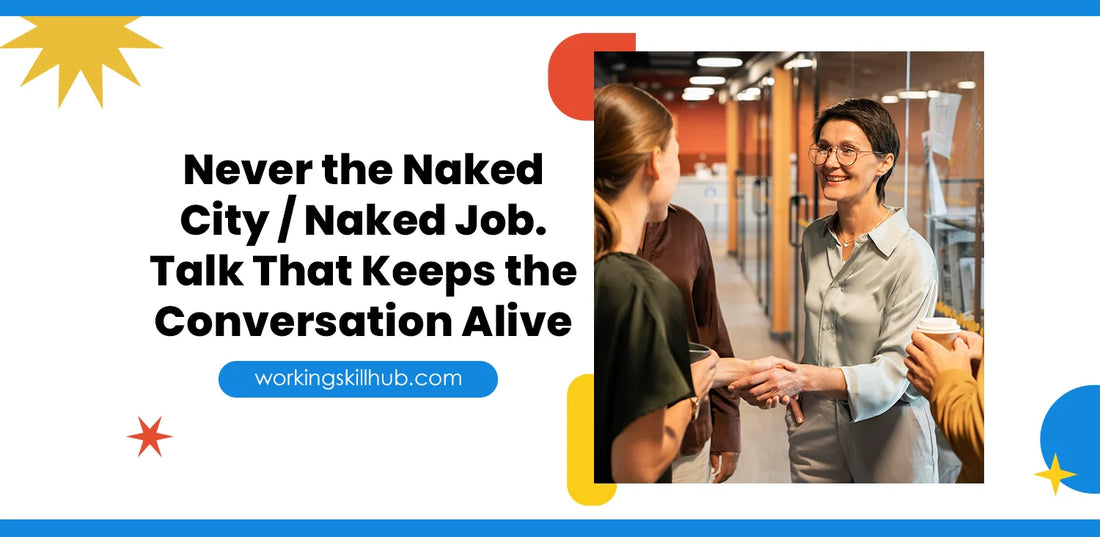Never say just “I’m from X” or “I’m an accountant.”
Give a little hook or a quick benefit so people can talk with you. That keeps conversations going.
People with strong communication skills get farther in life. Studies show about 85% of success comes from how you deal with people — not only what you know.
At events or meetings, two simple questions often end talks before they start: “Where are you from?” and “What do you do?” A one-word answer kills the chat. We call those answers the “Naked City” and “Naked Job.”
Fix them. Give fuel. Give a hook. Make it easy for the other person to reply.
The Conversation Killers
-
Naked City: “I’m from Columbus.” → Dead end.
-
Naked Job: “I’m an actuary.” → Boring, unclear.
When you drop a short fact with no story, the listener has nothing to ask next. Don’t leave them “flopping on the deck.” Give bait they can nibble.
1) Never the Naked City — Give Them the Hook
Make your place interesting. Add one quick fact that invites talk.
How to answer “Where are you from?”
-
Add a surprising fact:
Not: “I’m from Washington, D.C.”
Try: “I’m from Washington, D.C. — it was planned by the same person who helped design Paris.”
That opens talk about cities, design, or travel. -
Tailor to the crowd: If you’re at an art show, mention art. If you’re with singles, mention the social life.
-
Keep it short and vivid so people can ask follow-up questions.
Example hooks
-
“I’m from Austin — great live music every weekend.”
-
“I grew up in Seattle — I miss the coffee more than the rain.”
-
“From Buffalo — yes, the wings are famous, but the lakes are wild.”
2) Never the Naked Job — The Nutshell Résumé
Don’t only say your title. Tell what you do and how it helps people.
What is a Nutshell Résumé?
A short, clear sentence that shows the benefit of your work.
How to answer “What do you do?”
-
Focus on the benefit: “I help people plan their money” is better than “I’m an actuary.”
-
Add one small story or example: a quick line that shows real help you gave someone.
-
Use plain words so anyone understands.
Examples
-
Bad: “I’m a copywriter.”
Better: “I write short ads that help stores sell 20% more.” -
Bad: “I’m a lawyer.”
Better: “I help workers keep their jobs after a leave or unfair firing.”
3) Make a Lasting Impression — Words + Body
Good words are not enough. Your look and small actions matter.
Be a “Whatzit” — something people can ask about
-
Wear or carry one small, unique item: a pin, a scarf, a small badge. It gives people an easy opening line.
Don’t hide behind food or drink
-
At networking, avoid holding a plate or cup. Hands free = easier to meet people.
Know one fresh talking point
-
Read a headline or listen to a 60-second news update before going. You’ll have something current to say.
Use showmanship
-
Say things with energy and simple drama. A short story or a clear image makes your idea stick.
Body language quick tips
-
Stand tall.
-
Smile slowly and sincerely.
-
Make friendly eye contact.
-
Use a calm voice and show interest.
Quick scripts
-
Where are you from? → “I’m from [City]. Fun fact: [one hook].”
Example: “I’m from Portland — we have a tiny bookstore on every corner.” -
What do you do? → “I [what you do] so that [how it helps people].”
Example: “I design websites so small shops sell more online.” -
If someone asks more: → “Have you ever been there / thought about that?” or “What do you like about [topic]?”
Giving a little extra information makes people want to ask more. It shows you’re friendly, interesting, and ready to talk. That starts real connections instead of awkward silences.

